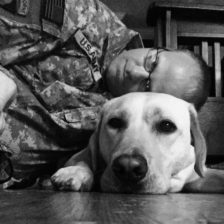Today is National PTSD Awareness day. I know what you might be thinking, “there’s a day for that?” And yes, there is.
While I am aware that PTSD affects more than just some Veterans (read: some, not all), PTSD is real, complicated, and frustrating. Around 70 percent of people in the U.S. have experienced some type of highly traumatic event at least once in their lives.
In our home, PTSD lingers and rears its ugly head daily.
A few symptoms of PTSD are: fear and anxiety, being on alert or having some jumpiness (startled easily), depression (sadness, feeling down and blue), guilt and shame (Survivor’s Guilt, wondering why you survived and someone else did not), anger (irritability, frustration), avoidance (wanting to be alone and isolate), and hypervigilance.
I see all of these from time to time (some more than others) with Sam.
Our first clue that PTSD was a real issue was a vacation we took around the 4th of July a few years back. We (and everyone else in the Metro East area) were at the fireworks display in Forest Park. Talk about crowd…that was (should have been) a clue for me. The crowd was going to be an issue. Sam was on alert and jumpy when some idiot (sorry, there are probably worse names I could use, but we will go with “idiot”) set off fireworks in the crowd. Not exactly something that anyone wants to hear, let alone a Veteran who has been in firefights at close range.
So, once the crowd started to leave, Sam left. He left me with chairs, blankets, bags, and kids.
He had to leave. It was too much.
And all of those symptoms that I just listed above kicked in. Really kicked in.
That was our turning point. That is when had to sit down and have a “come to Jesus” talk about the future of our family and life together.
That was the first time my kids *might have* noticed PTSD.
And since then we have battled. There have been really good days and really bad days. Days where the anxiety is almost crippling: Sam says his whole body goes “a hundred miles an hour,” breathing is rapid, sweating is intense, and shaking occurs. Days where talking about events, triggers, and deployments are okay (in therapy, which we both attend), days where depression seeps in and avoidance comes along too.
PTSD is real. A disorder, a symptom, an issue, a concern, whatever you choose to call it (I call it an annoyance and thief), it is something we need talk about, we need to address, we need to recognize daily, not just for a month, or a day, but year round: 24/7, 365.
We have to end the stigma.
Chemical changes occur in the brain with PTSD. I feel a little cheated that I will never know the Sam before war because during those deployments Sam’s life changed. When you get blown up multiple times, lose soldiers, and see life and death moments first hand you are not the person you once were.
Instead I rely on stories, Sam’s spotty memory of various times prior to war, and the stories of others to get to know him (still, after all these years).
And while there are times of distance, I am reminded that PTSD does not make one weak, in fact, it makes people stronger. I’ve watched Sam face some really daunting situations as a civilian, and know that part of his military training and instinct kick in. He’s been through many losses in life, only to survive and gain some of the most beautiful things that money cannot buy.
While there are some who struggle, turning to alcohol and drugs to “numb” the pain, we’ve gone down the therapy route. Now don’t get me wrong, Sam will tell you he was in a very, very dark place. But with therapy, talking, lifestyle changes, and hope one can come around. One can make changes.
The biggest key for us? Communication. I’m sure you all have heard or read stories of how military families can split, how there is cheating when one is deployed, and how tough the transition can be. I would attest to that: it is hard. It is challenging. But, talking helps. Letting your loved ones really know how you are feeling, as uncomfortable as it might be to hear it, we have to be open to listen. NO judgement, just listen.
Coping with PTSD and ultimately healing and processing will be different for each individual or each family. What works for us may not work for others. We stay focused, we stick to a schedule (although now it feels like that schedule is run by a baby), and we communicate. There are small things we can do together: go for walks, cook together, watch a Netflix or Hulu show together, or simply sit in our recliners and chat.
We manage and we survive. That is how we battle PTSD. It affects all of us. We know the signs and symptoms, we see the triggers, and our kids sometimes have to act as a secondary caregiver. We are not weak. We are strong. And we are stronger together.


Thank you for sharing your story with us it really helps us put things into focus in our own life.